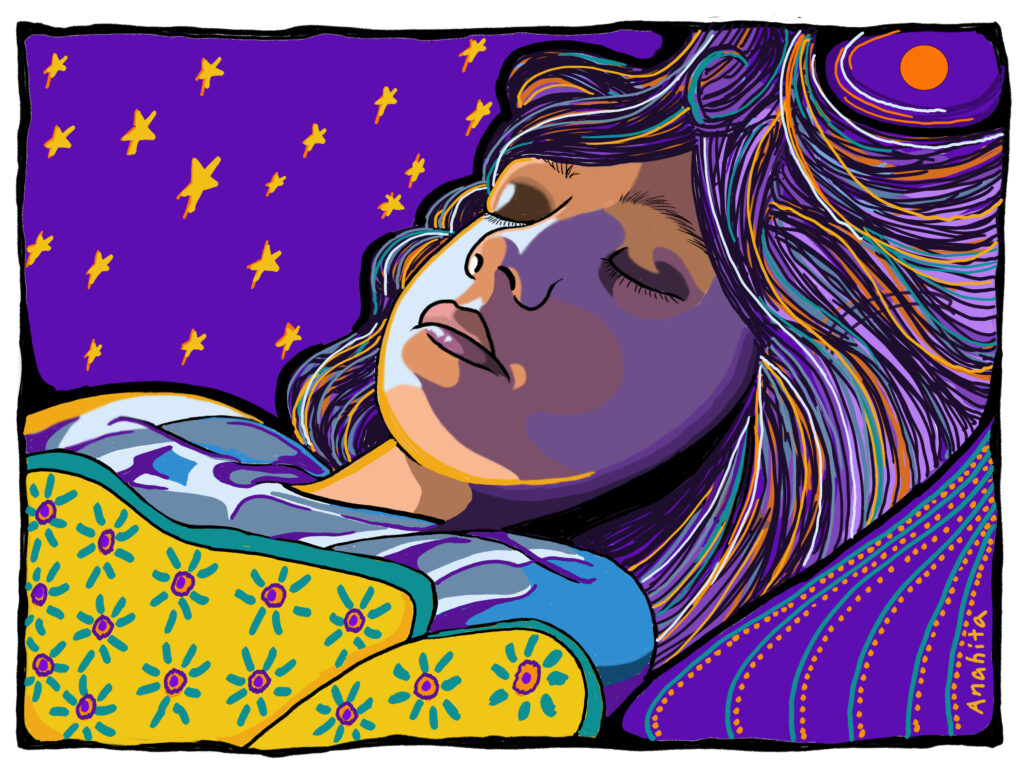
I awoke to a blood-curdling scream. Was the sound human, a demon, or a denizen of the dark?
“Aaaaooooooooooouuuuwwwwwwhhh!”
A second, higher, supersonic screech followed.
“eeeeeeeeeeEEEEEEEEEEEE!”
I threw off the yellow-flowered quilts cocooning me, jumped out of bed, and launched down fifteen steps of the dark staircase, steep and narrow, in three gargantuan leaps. At the bottom of the staircase, I found my mom screaming and holding up her hand, tiny bulbs of blood rising from needle-like punctures in her finger.
“eeeeeeeeeeEEEEEEEEEEEE! eeeeeeeeeeEEEEEEEEEEEE!”
A panicked otherworldly screech riveted my attention to the top of the dining room curtains in our 1890s-era farmhouse—narrow-windowed and high-ceilinged. Our home had been moved to town by draft horses in the early 1900s and converted into a Baptist church parsonage. The ornate woodwork around the windows, although coated with decades of white paint, held faded images of a swaddled Baby Jesus. Next to the paint-covered traces of Baby Jesus, a tiny creature — furry, white-faced, big brown eyes wide and black with terror — cowered and screamed decibels above my mom’s hysterical shrieking.
“It’shh okay,” I cooed calmly to the frightened creature. My speech impediment slurred my s sounds when air escaped through the side of my mouth. “We won’t hurt you. We are your new family. We love you and want to take care of you,” I continued in low and caring tones that I hoped would dissipate the fear flooding the tiny creature’s eyes.
“Mom, he didn’t mean to hurt you,” I said. I turned to my mom. She had stopped screaming and cradled her punctured, throbbing finger. “He’ssh jusht schkared.”
Mom had opened and reached into the cage intending to clean up the soiled papers lining the bottom. She hadn’t realized how terrifying a huge, strange hand thrust into the cramped cage might feel to a tiny creature inside. I knew. My eight-year-old self understood how frighteningly confusing interacting with people could be. Kids my age taunted and mocked me with slushy, slurry imitations of my speech impediment.
“Say ‘Sally sells seashells down by the seashore’,” older kids would command, shoving me into corners to block my escape. My sputtering elicited peals of laughter from my tormentors, followed by my submersion into deluges of humiliating, debilitating tears.
I turned from Mom to the creature perched high on the curtain rod. I talked to him, without words, from the heart, through eyes brimming with tears.
I told him I understood how scary the world of people could be. People don’t mean to hurt us … they just don’t understand how painful and scary it is to live in a world of words we can’t pronounce the way others do. They don’t know how to translate what our eyes and hearts are saying.
I raised my outstretched open hands to the frightened animal. My eyes and my gestures pronounced what my tongue could not. I communicated silently, lovingly, tears streaming down my cheeks. I wanted him to understand how now we had found each other, we could make it in this world together.
My Dad had surprised us the night before when he’d brought home this new four-legged future family member from a trip to the city. We lived miles from towns of any size, and a hundred miles north of Des Moines. Trips to Des Moines were infrequent, thus filled with stops to pick up needed supplies. The Earl May Nursery and Garden Center headed the destination list for Dad’s city excursions.
Dad loved the Earl May stores and rarely passed up a chance to visit. Earl May founded his mail-order seed company and retail nursery in Shenandoah, Iowa in 1919, selling baby chickens, tires, batteries, paint, shoes, clothing, and seeds. May built a radio station to promote his business with homespun farming and gardening programs, winning him the World’s Most Popular Radio Announcer award, and a special place in the hearts and retail lives of Midwesterners.
Strange sounds and movements had drawn my dad to the pet department corner of the Earl May store. Wide, bright, inquisitive, and searching eyes immediately transfixed him.
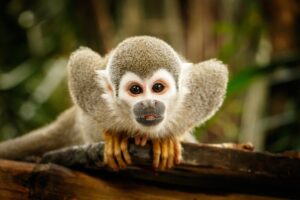
“Yep, this is a squirrel monkey, like the amazing Miss Baker, the first American animal successfully launched into space,” proudly proclaimed an eager young Earl May employee who had sidled up to Dad.
“No wonder the space program picked a squirrel monkey for that important mission,” Dad replied. “You can see the intelligence in this little guy’s expressive eyes!”
My Dad was a voracious reader of National Geographic, Scientific American, and Popular Science. The previous year, he had read all the intricate details of Miss Baker’s famous May 28, 1959 space flight.
“Miss Baker’s space capsule was the size of a thermos bottle,” Dad exclaimed in wonder as he held out his hands in front of the monkey enclosure and brought the two to within twelve inches of each other.
Dad hadn’t planned to add another four-legged member to our family. Reaching out toward the monkey impelled his spontaneous decision to bring this intelligent, 10-inch, 20-ounce, nearly human-faced squirrel monkey home to join our household. People in town called our place the Wilson Menagerie. Animals filled our house and yard. We took in orphaned or injured animals who needed care, attention, and love. We’d taken in an opossum, a raccoon, baby bunnies, birds, snakes, and a runt pig who wouldn’t have lived without loving care and attention. Our family’s relationship with animals had always revolved around taking care of those in need. Purchasing an animal, however, was a first for Dad, a first for our whole family. But how could he turn away from those big brown eyes and the slender fingers reaching out to him?
“We’ll be home in a couple of hours,” Dad explained, lovingly placing the tiny monkey-filled parakeet cage at his side on the truck’s broad bench seat. “You sit right here beside me so you can reach out if you need anything,” Dad continued. “This parakeet cage was the only transport vehicle available at Earl May’s. It’s not as fancy as Miss Baker’s capsule, but it is bigger,” Dad grinned. The monkey listened, cocked his head to one side, then settled in for the long ride home.
Dad rolled in from Des Moines after supper that night. My heart melted the minute I caught sight of the tiny, bright-eyed, furry being looking out at me from the birdcage bars. We had little time before bed to get acquainted with the monkey, or for the monkey to become accustomed to his new home. We would have to wait until morning for proper introductions and for Dad to fabricate a spacious enclosure where the monkey, lithe and strong-thighed, could leap and swing.
That night I dreamt of a calm and cozy morning the next day, bonding with my new monkey friend. The proper introductions I’d envisioned were upended by the early morning cacophony. Instead of calm, I’d found myself amid chaos. Our entire family gathered in the dining room. Mom cradled her punctured finger. My little sister Suz, wide-eyed, gasped for breath. My brother Ken rubbed his eyes to wipe away the sleep (or was it to clear his vision to make sure what he thought he saw was really happening?). Dad, the last one down the stairs, donned leather gloves to grab the monkey, who had started frantically leaping from curtain to curtain. The rest of us ducked and dodged to stay clear of the flying, shrieking, fear-propelled dynamo. The monkey’s scared screeching continued.
“eeeeeeeeeeEEEEEEEEEEEE! eeeeeeeeeeEEEEEEEEEEEE!”
Dad, always ready to do what had to be done, jumped up on the dining room table, grabbed the monkey, and, as gently as possible under the circumstances, placed the monkey back into the cramped parakeet cage. Dad must have seen the distress in my eyes at the sight of the monkey stuffed back into the tiny cage.
“When I get off work at the hardware store this afternoon, I’ll pick up a roll of large woven wire fencing, then come to get you so we can head back uptown to Grandpa Wilson’s shop,” said Dad, his hand on my shoulder. Grandpa Wilson had a furnace-fabricating shop, and Dad said he would have the tools and equipment we would need to bend the woven wire into a comfy, safe home for the monkey.
Awaiting Dad’s return from work, I stationed myself beside the distraught little monkey to let him know he was not alone. I wanted to show in actions, not just words, that I would stick with him and protect him as best I could from scary interactions with people and the world.
“I know you are schkared. I get schkared too when people pussh me into cornersh and it feelsh like the wallsh are closshing in on me,” I whispered to the monkey, my face drawn up close to the birdcage bars.
“Time to pick a name for you now that you are part of the family,” I continued. “You are a schquirrel monkey. Missh Baker would probably be a good name, but you are a boy, and her name ish too hard to shay anyway. How about Monk? You look like a wisesh old man who knowsh all. I’m sshure you have much to teach me.”
I felt the monkey’s bright eyes radiate agreement, wisdom, and knowledge.
“I anoint you Monk,” I proclaimed with a bold gesture to mark this private, auspicious ordination ceremony.
Monk and I spent the morning and early afternoon getting to know each other. I told him about my favorite food, rainbow ice cream. I also shared my disgust for the tater tots and fish sticks that Mom would pull out of the icebox, dump on a cookie sheet, pop in the oven turned on high, then deposit on our plates. She called this a meal and expected us to eat every bite.
“I’ll never make you eat grossh junk like tater totsh and fissh shticksh,” I assured him. Then I opened the bag of monkey chow Dad bought at Earl May. I was horrified to see that it looked to me like burnt tater tots Mom had left in the oven too long. I took a tentative bite of a monkey chow barrel to determine if this specially formulated diet was as bad as the tater tots Mom tried to pass off as food.
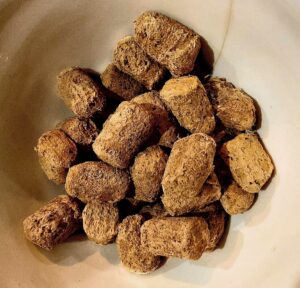
“Thish Monkey Chow doeshin’t tashte grossh like tater totsh,” I assured Monk. “Lucky you have needle-ssharp little teeth though, thessh are nearly rock-hard. You’ll need your needle teeth to bite into them!”
The barrel-shaped monkey chow nuggets were too big to pass through the tiny birdcage bars. I searched for something small enough to fit through the bars so I could touch hands with Monk. A bag of raw unsalted, unshelled sunflower seeds Dad had placed on the table next to the birdcage fit the bill perfectly. I held one sunflower seed between my fingers and held my hand up to the bars. Monk reached over, tentatively, grasped the sunflower seed, cracked it open with his teeth, ate the tender meat, and dropped the shell halves to the bottom of the cage. He stuck his hand out for more. I passed sunflower seeds through one at a time, then eventually held out my cupped hand mounded with sunflower seeds close to the bars of the cage so Monk could pick out whichever seed he desired. I tried a few of Monk’s seeds myself. I told him I liked the salted sunflower seeds better, but I figured those might not be good for monkeys.
I told Monk I’d look up squirrel monkeys in our World Book Encyclopedia after we finished our snack, and promised to read the entry aloud to him to see if he agreed with what the encyclopedia had to say. I often read aloud to myself when no one was around, to practice making s sounds. The s sounds never came out like they were supposed to, but I figured Monk wouldn’t laugh or make fun of me even if I didn’t pronounce the sounds right.
Monk sat, calm and relaxed, his long arm stretched through the birdcage bars. His fingers delicately caressed my face, and his eyes lit up and sparkled, no longer deep, black, fear-filled fissures. I propped the hefty white, gold-gilded M volume of the World Book beside Monk in his cage. I could feel trust and love building, the bonds between us growing.
“Schquirrel monkeysh like you come from Cshentral and Sshouth America,” I read to Monk, holding the heavy World Book up so he could see the pictures. “I wonder if you traveled all the way here from way down there,” tracing my finger across the map of where squirrel monkeys live, “or if you were born here in Iowa like me.” I pointed, resting my finger on where Iowa is located, to show Monk where our life together had begun.
I told Monk I’d learned about Central and South America when Al Bell came to our school and presented programs and films of his travels. I loved Al Bell’s programs but was traumatized by the scorpions crawling and jumping in the film he showed. I confessed to Monk that I checked my bed every night to make sure no scorpions had crawled inside. Each morning I also checked my shoes. Al Bell warned that shoes were a perfect place for scorpions to hide.
“We can work together to keep each other shafe from sshcary sschorpionshs from now on, OK!” I rejoiced as I talked to Monk about how we could take care of each other.
Dad and Mom usually took a nap in their overstuffed recliner chairs when Dad came home from work, but, as promised, this day after Monk’s arrival, Dad and I went to Grandpa Wilson’s shop to build an enclosure for Monk. I hated to leave Monk for even a minute, but I knew that the cage construction work might be noisy and scary for him.
Dad had crammed a 6-foot-tall roll of 4-inch, woven-wire fencing, plus fasteners and tools, into the back of our two-toned pink fan-tailed Plymouth Suburban station wagon. He’d collapsed the back seats to make room for the roll of fencing.
“We won’t need this much fencing to make a roomy home for Monk, but I want to make sure we have plenty,” Dad explained. “The space we have in the living room by the darkroom door is big enough for a 4-foot-tall by 3-foot-wide enclosure. We’ll build shelves and a trapeze, so Monk can swing around and exercise. And, he will be able to look right across the room at the tropical fish tanks on top of the encyclopedia bookcase. He will feel like he is in the jungle, with the view of the fish swimming out the front door of this home, and the big oak tree outside the window at the back,” Dad assured me.
We triumphantly returned home carrying Monk’s new luxury high-rise accommodation as if it were a processional litter for a king. I pretended we were the servants in the Tarzan movies we watched on Saturday nights. Dad joined in the performance as he ceremoniously hoisted the enclosure onto the elevated frame he’d created. The frame was an ingenious and practical work of art, topped with linoleum plus a layer of newspapers to catch and absorb the monkey droppings. Dad had thought of everything, constructing the cage and stand so Monk had a perfect view, and we could keep Monk’s abode fresh and clean by simply sliding out the soiled newspapers. No need to reach into the enclosure for litter clean-up.
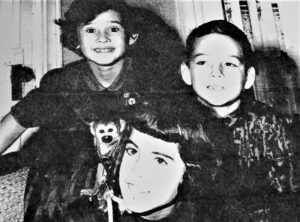
Mom gently clapped her hands in approving delight. Still favoring her punctured finger, and perhaps realizing that quick movements and sounds could startle the monkey, she toned down her customary exuberance. I lovingly carried Monk in his birdcage from the dining room to his new quarters in the living room. Dad opened the large front entrance to the new enclosure as I held the birdcage up and opened its door to form a bridge for Monk’s entrance into his new world.
Monk sprang in and swung joyously on the trapeze.
“That’sh much more fun than shwinging from thosh old dining room curtainsh, ishn’t it, Monk?” I said through a huge beaming smile.
Mom, Dad, Ken, and Suz all smiled from ear to ear as my unbridled joy bubbled up and overflowed.
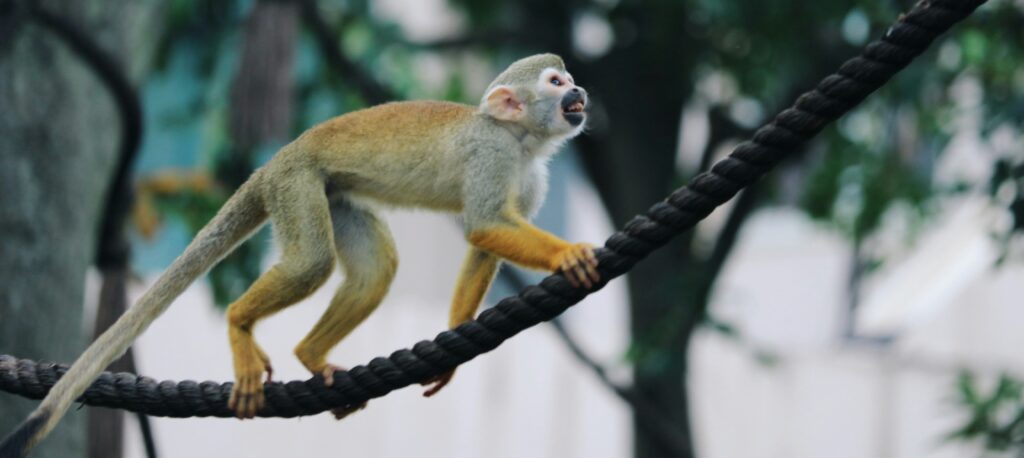
NOTE: In 1960 it was legal to import, sell, purchase, and keep exotic animals as pets. Since 1975, it has been illegal to import nonhuman primates into the United States for the pet trade (42 CFR 71.53). However, primates could be raised, purchased, and kept as pets until states passed laws prohibiting such practices. Iowa Code 717F 21 (2007) and Iowa Admin Code 77 (2013) were enacted to prohibit buying or keeping monkeys as pets.
 Art and photographs courtesy of Sine Anahita, Kayt Sunwood, Paul Wilson, Ludmila Ruzickova and Raychan.
Art and photographs courtesy of Sine Anahita, Kayt Sunwood, Paul Wilson, Ludmila Ruzickova and Raychan.
Copyright © 2024 by Kayt Sunwood
Kayt Sunwood
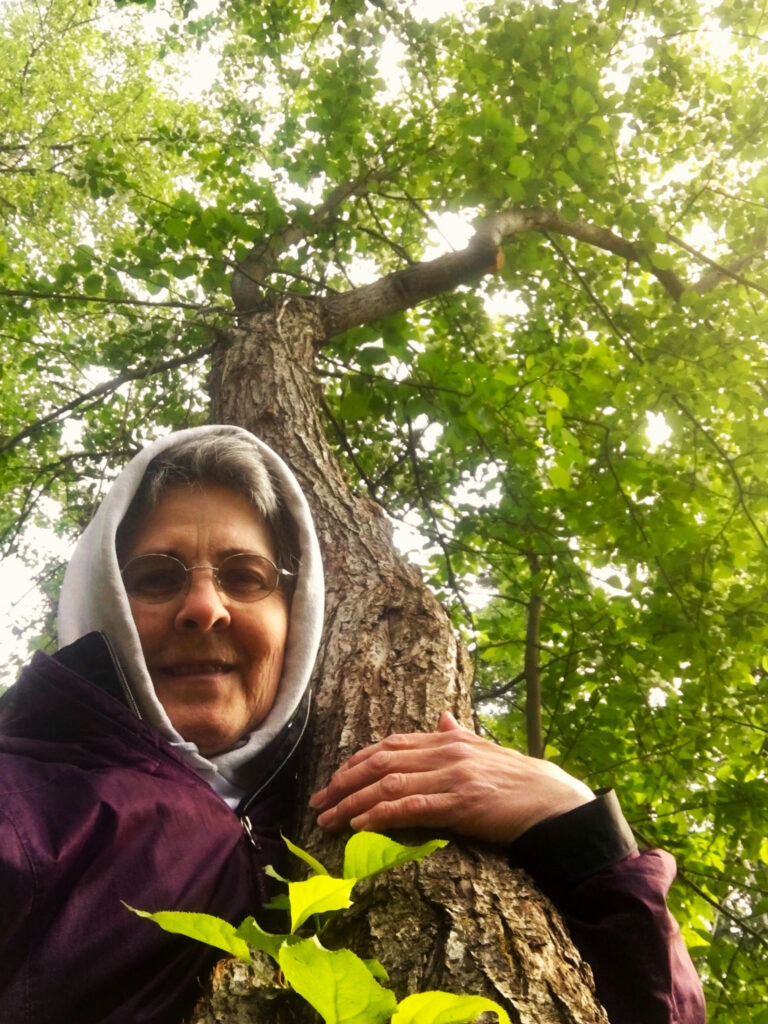
From Iowa to Alaska
Kayt Sunwood lives in a wooded valley in Interior Alaska, nestled between mountains. She returned to Iowa in the 1990s, earning a Ph.D. in Education from Iowa State University. After her retirement in 2016, Sunwood continues to teach and play upright bass in several bands. “Beginnings” is the first chapter of her memoir.